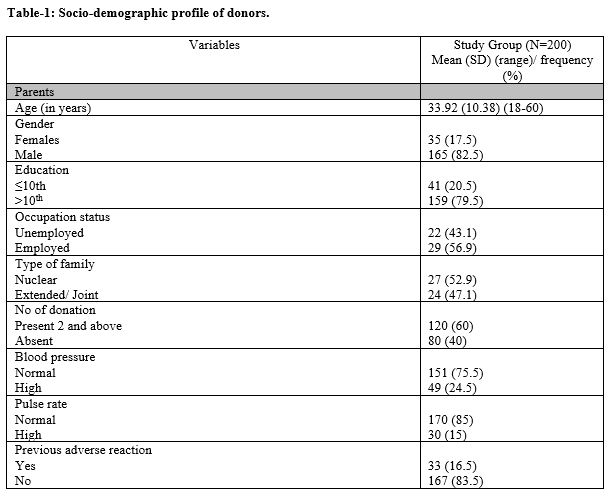Evaluation of pre-donation anxiety and attitude of blood donors and its effect on blood pressure and pulse rate
Abstract
Background: Previous negative experiences (NEs) during the process of blood donation can result in increased stress and is indicated by blood pressure and pulse rate, at a subsequent donation. The present study investigated the effect of attitude and anxiety in 1st time and regular blood donors with or without any previous NE on the pre-donation blood pressure and pulse rate.
Materials and methods: Pre-donation blood pressure and pulse rate in 1st time and regular donors were measured. The attitude and anxiety were evaluated using a questionnaire and the relationship with a previous NE was assessed. Its effect on the blood pressure and pulse rate was subsequently evaluated. The study was a between-subjects, observational design.
Results: Of the total 200 donors, 165 were males. 54 donors showed signs of anxiety whereas 33 donors had a previous NE. 11 donors (22.44%) who had a previous negative experience showed raised blood pressure whereas 9 donors (18.36%) with a previous negative experience showed a raised pulse rate. Both effective (-0.293) and cognitive (-0.0159) attitudes were negatively correlated with anxiety and were found to be statistically significant.
Conclusion: No significant association was seen in a donor who experienced a negative experience in a previous visit with raised pre-donation blood pressure however, was significantly associated with a raised pulse rate. Moreover, anxiety and increased blood pressure, and increased pulse rate were assessed in first-time donors and it was seen that first-time donors especially showed raised blood pressure and pulse rate.
Downloads
References
Ali A, Auvinen MA, Rautonen J. The aging population poses a global challenge for blood services. Transfusion. 2009;50(3):584-588. doi: 10.1111/j.1537-2995.2009.02490.x.
Greinacher A, Fendrich K, Alpen U, Hoffmann W. Impact of demographic changes on the blood supply: Mecklenburg-West Pomerania as a model region for Europe. Transfusion. 2007;47(3):395-401. doi: 10.1111/j.1537-2995.2007.01129.x.
Nilsson Sojka B, Sojka P. The blood-donation experience: perceived physical, psychological and social impact of blood donation on the donor. Vox Sang. 2003;84(2):120-128. doi: 10.1046/j.1423-0410.2003.00271.x.
France C, Rader A, Carlson B. Donors who react may not come back: Analysis of repeat donation as a function of phlebotomist ratings of vasovagal reactions. Transfus Apher Sci. 2005;33(2):99-106. doi: 10.1016/j.transci.2005.02.005.
Newman B, Newman D, Ahmad R, Roth A. The effect of whole-blood donor adverse events on blood donor return rates. Transfusion. 2006;46(8):1374-1379. doi: 10.1111/j.1537-2995.2006.00905.x.
Hoogerwerf, MD, Veldhuizen I, de Kort W, Frings-Dresen M, Sluiter J. Factors associated with psychological and physiological stress reactions to blood donation: a systematic review of the literature. Blood Transfusion. 2015;(13):354-362. doi: 10.2450/2015.0139-14.
Hoogerwerf M, Veldhuizen I, van den Hurk K, de Kort W, Sluiter J, Frings-Dresen M. Negative experiences and predonation blood pressure at the subsequent donation in blood donors. Vox Sang. 2015;110(2):107-115. doi: 10.1111/vox.12319.
Ulrich-Lai Y, Herman J. Neural regulation of endocrine and autonomic stress responses. Nat Rev Neurosci. 2009;10(6):397-409. doi: 10.1038/nrn2647.
Ayada C, Toru Ü, Korkut Y. The relationship of stress and blood pressure effectors. Hippokratia. 2015;19(2):99-108.
Bellitti P, Valeriano R, Gasperi M, Sodini L, Barletta D. Cortisol and heart rate changes in first‐and fourth‐time donors. Vox Sang. 1994;67(1):42-45. doi: 10.1111/j.1423-0410.1994.tb05036.x.
Veldhuizen I, Ferguson E, de Kort W, Donders R, Atsma F. Exploring the dynamics of the theory of planned behavior in the context of blood donation: does donation experience make a difference?. Transfusion. 2011;51(11):2425-2437. doi: 10.1111/j.1537-2995.2011.03165.x.
van Dongen A, Abraham C, Ruiter R, Veldhuizen I. The influence of adverse reactions, subjective distress, and anxiety on retention of first-time blood donors. Transfusion. 2012;53(2):337-343. doi: 10.1111/j.1537-2995.2012.03810.x.
Hoogerwerf M, van Dongen A, Middelburg R, Merz E, de Kort W, Frings-Dresen M et al. Negative experiences and pre-donation blood pressure: the role of attitude and anxiety. Transfusion Medicine. 2016;27(2):105-113. doi: 10.1111/tme.12374.
France C, France J, Wissel M, Ditto B, Dickert T, Himawan L. Donor anxiety, needle pain, and syncopal reactions combine to determine retention: a path analysis of two-year donor return data. Transfusion. 2013;53(9):1992-2000. doi: 10.1111/trf.12069.
van Dongen A, Abraham C, Ruiter R, Schaalma H, de Kort W, Dijkstra J et al. Are lapsed donors willing to resume blood donation, and what determines their motivation to do so?. Transfusion. 2011;52(6):1296-1302. doi: 10.1111/j.1537-2995.2011.03447.x.
van Dongen A, Abraham C, Ruiter R, Veldhuizen I. Does Questionnaire Distribution Promote Blood Donation? An Investigation of Question–Behavior Effects. Ann Behav Med. 2012;45(2):163-172. doi: 10.1007/s12160-012-9449-3.
France C, France J. Fear of donation-related stimuli is reported across different levels of donation experience. Transfusion. 2017;58(1):113-120. doi: 10.1111/trf.14382.

Copyright (c) 2020 Author (s). Published by Siddharth Health Research and Social Welfare Society

This work is licensed under a Creative Commons Attribution 4.0 International License.


 OAI - Open Archives Initiative
OAI - Open Archives Initiative


